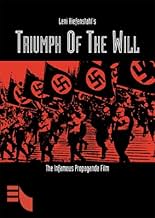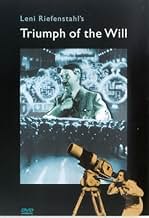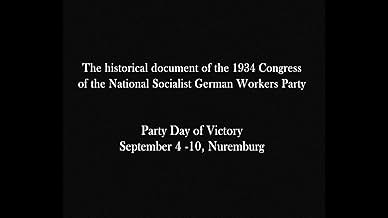- Awards
- 1 win & 1 nomination total
- Director
- Writers
- All cast & crew
- Production, box office & more at IMDbPro
Featured reviews
A historical film capturing the1934 Nazi party rally in picturesque Nazi hotbed of Nuremberg, Filmed over a number of days it contains all the leading lights of National Socialism in pre-war Germany making speeches to the faithful. It also shows the various clips of the different organizations within National Socialism ie.The Hitler Youth in all their Arian glory excited and in gleeful expectation of seeing their Fuhrer,The goosestepping standard bearers of the S.A. and the S.S. paying homage to their glorious leader. Triumph of the Will captures the state of the German nation and the Nazi mindset perfectly ,and I felt a sense of foreboding with the bluntness of some of the speeches. The film is full of very striking German Expressionism Cinema techniques,never more so than in the night shots, full of torch bearing storm troopers and the Nazi faithful hailing their glorious leader..Goebbels vision was put brilliantly to film by Riefenstahl who had over thirty cameras to film every incident of the event.This is truly a masterclass in Propaganda but it is also one in Cinema,Triumph of the Will truly is a triumph of Cinema and despite its content should be seen as one. Riefenstahl for her part was imprisoned for four years after the war and never was able to reinvent her career as a top Director,a real and tragic loss to Cinema
In 1934, the Nazi fortress was built on the election of Adolf Hitler as chancellor, the timely death of Hindenburg, and the infamous purge that caused the deaths of hundreds of SA members, the most emblematic one, being Rohm. Hitler's aura was then total but he needed to touch the German people in the broadest way. Only the big screen could fulfill the ambitious challenge of controlling the people at a distance by immortalizing the Nuremburg Rally of 1934.
Indeed, in the 30's, in a totalitarian system, a man with a camera could be more powerful than any soldier, but this wasn't a man who was assigned the task, but a woman, a promising talent named Leni Riefenstahl. And "Triumph of the Will" is a triumph on the field of film-making as it delivers some of the most spectacular and impressively creative shots for their time as if Riefenstahl was driven by the same desire to try new techniques, like Orson Welles when he made "Citizen Kane", six years later. But there's a reason why "Citizen Kane" is considered a masterpiece and not "Triumph of the Will", and the answer comes from Orson Welles himself.
Welles said that you could make a masterpiece in anything: even in pornography, if you intended to excite people and stimulate them sexually. However, you could never make a masterpiece that happens to be a pornographic film, because a libido is too low and too easily aroused in the first place. I paraphrased him in my review of "Lifeboat" to explain that propaganda, reprises the same role as pornography: it arouses easy emotions, in that case, instinct of superiority. In other words, you can make a masterpiece of propaganda, but not a masterpiece that happens to be a 'propaganda' film. So if I want to stick to my guns and follow my logic, I would say "Triumph of the Will" is a masterpiece of propaganda, but not a masterpiece.
Does this really matter? Well, inasmuch as Riefenstahl claimed that she made a documentary, capturing a significant chapter of Germany's history, I think it's important to set things straight, call a spade a spade and "Triumph of the Will" propaganda. It has an indubitable documentary value, but only from the perspective of a non-Nazi sympathizer, which doesn't only mean the majority of people born after the War, but even the majority of non-German people at the very time of the film's release. I'm not sure Riefenstahl wanted to address the German people with a simple 'documentary' movie, not one that 'objectively' exhilarates Hitler's success in making the eagle rise from the ashes of World War I and the infamous Treaty of Versailles.
And this constitutes the prologue of the film, depicting Germany's recovery's as a miracle only 19 months after Hitler's election, and the next shot sets the tone. While you expect to see a swastika or some marching soldiers taken in reverse shot, what do you get? Clouds. It's a heavenly sight taken from Hitler's private plane, featuring him like an Angel coming from the sky, to save Germany. This is a very clever trick that foresees the uses of religious undertones in each shot. Hitler is like a messianic figure acclaimed by crowds all reassembled to cheer and shout for him. Even the rallies at night, with the flags and torches carry a strange mysticism that Leni's eye never fails to catch.
And this is a fearsome sect-like atmosphere where each sentence shouted, sometimes eructed in that guttural German accent is followed by Pavlovian "Sieg Heil". It's not people shouting, it's one voice in unison and this is another aspect of the film: masses; and Riefenstahl knows how to handle them. In the Nazi conception of people, there's no individuality, there's no possible order when you consider each person's specificity, because by doing so, you accept the presence of "parasites" and we know where this judgment leads No, each individual is like an atom linked to another one and assembling into one homogeneous form, a mass.
Look at these shots of workers carrying their shovels like rifles, at these young men during the roll call, or in their tents before Hitler's arrival, they all look the same, shirtless and smiling, either same uniform or same absence of uniform. There is a vertiginous shot at World War I memorial, perhaps the most beautiful of the film, where Hitler walks between rows of soldiers. The mass was so compact, that I thought it was a garden at first. This is a film made by a director who knows exactly the effects to create. Of course, she's right when she says that there's no anti-Semitic statement in the film, but that's beside the point. Such a movie touched German people and convinced the rest of skeptics that the salvation come from Hitler, so when the next rally of Nuremburg lead to the racial laws, the receptiveness of the people owed a little to this masterpiece of propaganda.
That said, I'm inclined to believe that Leni Riefenstahl, like a vast majority of Germans, believed, that salvation could only come from Hitler, and that she genuinely wanted to highlight this in her 'documentary'. Let's not just dismiss the film for what it is, and not get things mixed up. Its merit is not to be a documentary about a rally, it's too biased for that, but to provide hints of answers for the questions that come to mind after watching World War II or holocaust movies: how could that happen? Well, "Triumph of the Will" is almost meta-referential in the way the people's zeal is echoed by the filmmaker's stylistic approach. People wanted to believe in Hitler, they might have regretted it after, but they succumbed to his 'charisma' and in a way, his "will" as evil as it was, had triumphed.
It's only on the basis of this historical magnitude that the film can be considered great.
Indeed, in the 30's, in a totalitarian system, a man with a camera could be more powerful than any soldier, but this wasn't a man who was assigned the task, but a woman, a promising talent named Leni Riefenstahl. And "Triumph of the Will" is a triumph on the field of film-making as it delivers some of the most spectacular and impressively creative shots for their time as if Riefenstahl was driven by the same desire to try new techniques, like Orson Welles when he made "Citizen Kane", six years later. But there's a reason why "Citizen Kane" is considered a masterpiece and not "Triumph of the Will", and the answer comes from Orson Welles himself.
Welles said that you could make a masterpiece in anything: even in pornography, if you intended to excite people and stimulate them sexually. However, you could never make a masterpiece that happens to be a pornographic film, because a libido is too low and too easily aroused in the first place. I paraphrased him in my review of "Lifeboat" to explain that propaganda, reprises the same role as pornography: it arouses easy emotions, in that case, instinct of superiority. In other words, you can make a masterpiece of propaganda, but not a masterpiece that happens to be a 'propaganda' film. So if I want to stick to my guns and follow my logic, I would say "Triumph of the Will" is a masterpiece of propaganda, but not a masterpiece.
Does this really matter? Well, inasmuch as Riefenstahl claimed that she made a documentary, capturing a significant chapter of Germany's history, I think it's important to set things straight, call a spade a spade and "Triumph of the Will" propaganda. It has an indubitable documentary value, but only from the perspective of a non-Nazi sympathizer, which doesn't only mean the majority of people born after the War, but even the majority of non-German people at the very time of the film's release. I'm not sure Riefenstahl wanted to address the German people with a simple 'documentary' movie, not one that 'objectively' exhilarates Hitler's success in making the eagle rise from the ashes of World War I and the infamous Treaty of Versailles.
And this constitutes the prologue of the film, depicting Germany's recovery's as a miracle only 19 months after Hitler's election, and the next shot sets the tone. While you expect to see a swastika or some marching soldiers taken in reverse shot, what do you get? Clouds. It's a heavenly sight taken from Hitler's private plane, featuring him like an Angel coming from the sky, to save Germany. This is a very clever trick that foresees the uses of religious undertones in each shot. Hitler is like a messianic figure acclaimed by crowds all reassembled to cheer and shout for him. Even the rallies at night, with the flags and torches carry a strange mysticism that Leni's eye never fails to catch.
And this is a fearsome sect-like atmosphere where each sentence shouted, sometimes eructed in that guttural German accent is followed by Pavlovian "Sieg Heil". It's not people shouting, it's one voice in unison and this is another aspect of the film: masses; and Riefenstahl knows how to handle them. In the Nazi conception of people, there's no individuality, there's no possible order when you consider each person's specificity, because by doing so, you accept the presence of "parasites" and we know where this judgment leads No, each individual is like an atom linked to another one and assembling into one homogeneous form, a mass.
Look at these shots of workers carrying their shovels like rifles, at these young men during the roll call, or in their tents before Hitler's arrival, they all look the same, shirtless and smiling, either same uniform or same absence of uniform. There is a vertiginous shot at World War I memorial, perhaps the most beautiful of the film, where Hitler walks between rows of soldiers. The mass was so compact, that I thought it was a garden at first. This is a film made by a director who knows exactly the effects to create. Of course, she's right when she says that there's no anti-Semitic statement in the film, but that's beside the point. Such a movie touched German people and convinced the rest of skeptics that the salvation come from Hitler, so when the next rally of Nuremburg lead to the racial laws, the receptiveness of the people owed a little to this masterpiece of propaganda.
That said, I'm inclined to believe that Leni Riefenstahl, like a vast majority of Germans, believed, that salvation could only come from Hitler, and that she genuinely wanted to highlight this in her 'documentary'. Let's not just dismiss the film for what it is, and not get things mixed up. Its merit is not to be a documentary about a rally, it's too biased for that, but to provide hints of answers for the questions that come to mind after watching World War II or holocaust movies: how could that happen? Well, "Triumph of the Will" is almost meta-referential in the way the people's zeal is echoed by the filmmaker's stylistic approach. People wanted to believe in Hitler, they might have regretted it after, but they succumbed to his 'charisma' and in a way, his "will" as evil as it was, had triumphed.
It's only on the basis of this historical magnitude that the film can be considered great.
There is scarcely a review which doesn't focus on the meaning or message contained within this film.
I don't mean to suggest that those elements don't exist; I merely want to suggest that there is much more in this powerful film.
Like Olympia, this is a masterfully crafted work of art.
I don't mean to suggest that those elements don't exist; I merely want to suggest that there is much more in this powerful film.
Like Olympia, this is a masterfully crafted work of art.
This is the thinking person's horror film. Zombies? Ghosts? Lunatics with hockey masks and chainsaws generating gallons of fake blood? Not a tiny bit as scary as thousands upon thousands of people lined up in squares, gleefully losing their individual identities and glorifying in the group, willing to perform some of the most evil deeds imaginable for the perceived benefit of that whole.
If this film was done badly, it would be something to laugh at or study as a historical artifact, a relic of a past we left behind. However, its power, and why it can disturb to this very day, is the fact that it was done beautifully. Anyone who talks about equating "truth and beauty" should think about this film. It is certainly beautiful, but it is also in the service of a lie, and an evil one at that.
Sadly, I suspect that the types who make modern political propaganda and advertising get on their knees at night and pray for some of the inspiration that made this film. Stars? This film defies a star rating.
If this film was done badly, it would be something to laugh at or study as a historical artifact, a relic of a past we left behind. However, its power, and why it can disturb to this very day, is the fact that it was done beautifully. Anyone who talks about equating "truth and beauty" should think about this film. It is certainly beautiful, but it is also in the service of a lie, and an evil one at that.
Sadly, I suspect that the types who make modern political propaganda and advertising get on their knees at night and pray for some of the inspiration that made this film. Stars? This film defies a star rating.
10GBinAZ53
Triumph Des Willens was a blockbuster film in a number of ways. It was meant to be a proper memorializing of an annual NSDAP Parteitag held in Nurenburg. A prior attempt, Sieg Des Glaubens, had proved to be a failure. Adolf Hitler gave director Leni Riefebstahl full rein to use all means to make this film the success which he wanted. First, many innovations in camera techniques, sound synchronization, storyboarding, staging, etc., made movie history. Second, it was an overt appeal to the emotions of both Germans and foreigners that suggested the excitement for and the apparent power of the new Third Reich. Third, the film was part of a multimedia campaign ahead of its time. Its success was confirmed for many years by the almost universal ban most countries placed on its showings. And sixty years later it is still effective in both thrills and chills. Highlights: the first 20 minutes or so resemble a media drama; the solemn military reviews demonstrate components of state power; speeches illustrate the personnel in power at the time. Quite a package!
Did you know
- TriviaThe film spent six months in the editing suite. The two-hour running time represents approximately 3% of the footage Leni Riefenstahl shot.
- Quotes
[last lines]
Rudolf Hess: The Party is Hitler. But Hitler is Germany as Germany is Hitler! Hitler, Sieg Heil! Sieg Heil!
crowd: Heil! Heil! Heil!...
- ConnectionsEdited into Hitler Lives (1945)
- SoundtracksDie Fanhe Hoch (Raise High the Flag)
Horst Wessel
- How long is Triumph of the Will?Powered by Alexa
Details
Box office
- Budget
- DEM 280,000 (estimated)
- Runtime
- 1h 54m(114 min)
- Color
- Aspect ratio
- 1.37 : 1
Contribute to this page
Suggest an edit or add missing content




























